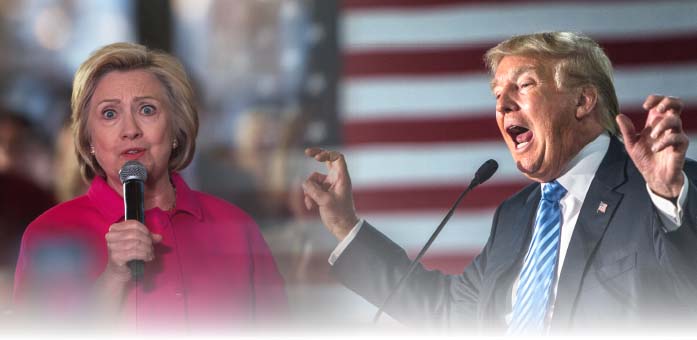By Mitch McAndrew
CLEVELAND — “Hillary for Prison 2016” signs spread across the Republican Convention floor, and choruses of boos showered at any mention of the name “Clinton,” suggesting that Hillary Clinton — not Donald Trump — has been the most effective at bringing the GOP together at its national get-together this week.
In interviews with The Daily Iowan, the members and delegates from the Republican Party of Iowa have been stronger in their disapproval of the presumptive Democratic presidential nominee than in their approval of their own party’s nominee.
“There are lots of misgivings out there about [Clinton],” said Iowa Gov. Terry Branstad, who is serving his sixth term as the state’s executive. “They’ll unify because they don’t want Hillary Clinton.”
Iowa Republicans, along with many speakers at this week’s convention, cited Clinton’s email scandal and the 2012 Benghazi attacks, during Clinton’s time as secretary of State as reasons for their contempt.
Earlier this month, FBI Director James Comey recommend no charges be filed against Clinton for her use of private email when she was at the State Department, but he said Clinton and her colleagues were “extremely careless” with classified information, which numerous convention speakers included in their addresses.
“The point is: there’s so much at stake,” Branstad said. “We literally can’t afford Hillary Clinton.”
With sizable factions of libertarian, socially conservative, and moderate-leaning Republicans, the Iowa GOP is no stranger to ideological dissonance.
But in an election year characterized by hyper-partisanship, stopping Clinton is one of few subjects the party presents a unified front on.
“Republicans in the state will end up choosing Trump,” said Tim Hagle, an associate professor of political science at the University of Iowa. “He isn’t their first choice, but for them, he’s better than Hillary Clinton for sure.”
Wes Enos, an Iowa district-level delegate and supporter of Sen. Ted Cruz, R-Texas, acknowledged the disagreements inside the party but said they were no match for the Republicans’ hatred of Clinton.
“There are always going to be detractors,” he said. “But in reality, there’s only one big decision to make: Trump or Hillary.”
In the first two days of the national convention, many speeches focused on tearing down Clinton instead of building up Trump.
New Jersey Gov. Chris Christie, for example, spent his entire Tuesday night speech “prosecuting” Clinton by presenting “facts” to the convention floor and asking delegates to return verdicts.
Based on the results of the 2016 Iowa caucuses, Cruz was Iowa Republicans’ first choice. He won Iowa’s first-in-the-nation contest with 27.6 percent of the vote, besting Trump’s 24.3 percent.
Additionally, as The Daily Iowan reported, 11 of the 12 district-level delegates elected in April to the national convention were Cruz allies.
Still, Republican National Committee rules state all Iowa delegates must vote as a block if only one name is submitted for nomination, which was the case Tuesday night when Iowa cast all 30 of its votes for Trump.
First in the nation
While Iowa Republicans vary in their support of Trump, party members said they are much more unified at this year’s convention than in 2012.
That year, with 2012 presidential-candidate Ron Paul supporters occupying key leadership roles in the party, including former Chairman A.J. Spiker, the state awarded 22 of its 28 delegates to Paul at the Republican National Convention in Tampa, despite his third-place finish in the Iowa caucuses.
Iowa GOP Chairman Jeff Kaufmann marked this event as a low point in the state party’s history and a moment when the state came close to losing its place as the first GOP caucus.
“We had lost our credibility nationally. They had embarrassed us at our convention in Tampa,” he said. “We were on the verge of losing our first-in-the-nation status.”
Four years later, Kaufmann was determined not to imperil Iowa’s prized caucuses again.
This year, he said the Never Trump movement posed the biggest threat to the state’s first-in-the-nation status. The group on Monday led a push to force a roll-call vote on rules that would free up delegates to vote their conscience.
Iowa was one of at least nine states that initially offered a majority of delegate support to force the vote, but the delegation later withdrew its support to protect the caucuses’ leading role in the primaries.
“What worries me about this Never Trump is what they’re asking us to do: forgo our grass-roots process,” Kaufmann said in an interview last week. “That, more than anything, will put our first-in-the-nation in jeopardy.”



